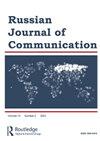In the city of the eccentrics: Glumov, Mr West and Oktiabrina
Q1 Social Sciences
引用次数: 0
Abstract
ABSTRACT In its cinematographic dimension, Soviet Constructivism turns the city into a stage upon which amazing deeds, burlesque situations and acrobatics are performed. The circus, music-hall and variety shows are the new genres that are incorporated first into the theatre, advocated by the Left Front of the Arts (LEF), and shortly afterwards into the cinema. At the same time, the urban space becomes the epitome of the technology propelled by the Soviet state, which drove the industrialisation of the country: factories, machines and engines, road traffic, telecommunications and, of course, the cinema. The present paper addresses these questions – the ‘technification’ and the eccentric view of the city of the Soviet cinema-makers – through the analysis of three period-defining works. The first of these is Glumov's Diary (S. M. Eisenstein, 1923), a satirical short film integrated in the mise-en-scene of Enough Simplicity for Every Wise Man, a play by Aleksander Ostrovski; the second is The Extraordinary Adventures of Mr West in the Land of the Bolsheviks (Lev Kuleshov, 1924); and the third work studied is The Adventures of Oktiabrina (Grigori Kozintsev and Leonid Trauberg, 1924), the first film by the FEKS group.在这座古怪的城市:格卢莫夫、韦斯特和奥克提亚布里纳
在电影的维度上,苏联建构主义把城市变成了一个舞台,在这个舞台上表演着惊人的行为、滑稽的情景和杂技。马戏、音乐厅和综艺节目是由左翼艺术阵线(Left Front of The Arts, LEF)倡导的,首先被纳入剧院的新类型,不久之后进入电影院。与此同时,城市空间成为苏联国家推动的技术的缩影,这推动了这个国家的工业化:工厂、机器和发动机、道路交通、电信,当然还有电影。本文通过对三个时期定义作品的分析,解决了这些问题——“技术化”和苏联电影制作人对城市的古怪看法。其中第一部是格卢莫夫的《日记》(S. M.爱森斯坦,1923年),这是一部讽刺短片,与亚历山大·奥斯特洛夫斯基的戏剧《给每个聪明人足够的简单》的场景布景相结合;第二本是《韦斯特先生在布尔什维克的土地上的非凡冒险》(列夫·库列绍夫,1924年);研究的第三部作品是《奥克提亚布里纳历险记》(格里戈里·科津采夫和列昂尼德·特劳伯格,1924年),这是FEKS小组的第一部电影。
本文章由计算机程序翻译,如有差异,请以英文原文为准。
求助全文
约1分钟内获得全文
求助全文
来源期刊

Russian Journal of Communication
Social Sciences-Political Science and International Relations
自引率
0.00%
发文量
0
期刊介绍:
Russian Journal of Communication (RJC) is an international peer-reviewed academic publication devoted to studies of communication in, with, and about Russia and Russian-speaking communities around the world. RJC welcomes both humanistic and social scientific scholarly approaches to communication, which is broadly construed to include mediated information as well as face-to-face interactions. RJC seeks papers and book reviews on topics including philosophy of communication, traditional and new media, film, literature, rhetoric, journalism, information-communication technologies, cultural practices, organizational and group dynamics, interpersonal communication, communication in instructional contexts, advertising, public relations, political campaigns, legal proceedings, environmental and health matters, and communication policy.
 求助内容:
求助内容: 应助结果提醒方式:
应助结果提醒方式:


